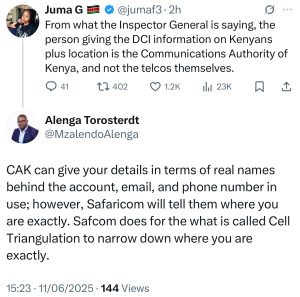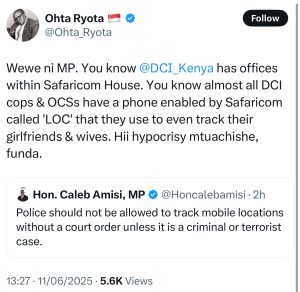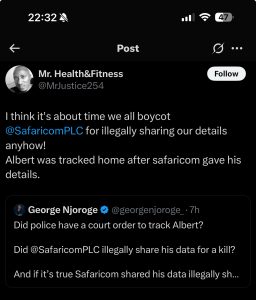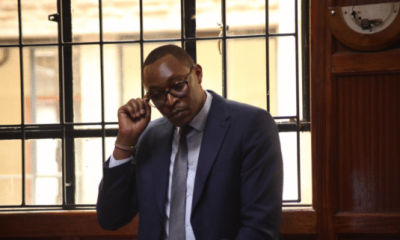News
Opposition Leaders Accuse Safaricom of Complicity in Albert Ojwang’s Death, Urge Nationwide Boycott
They specifically accused Safaricom of sharing Ojwang’s location data with authorities, facilitating his arrest and subsequent death.
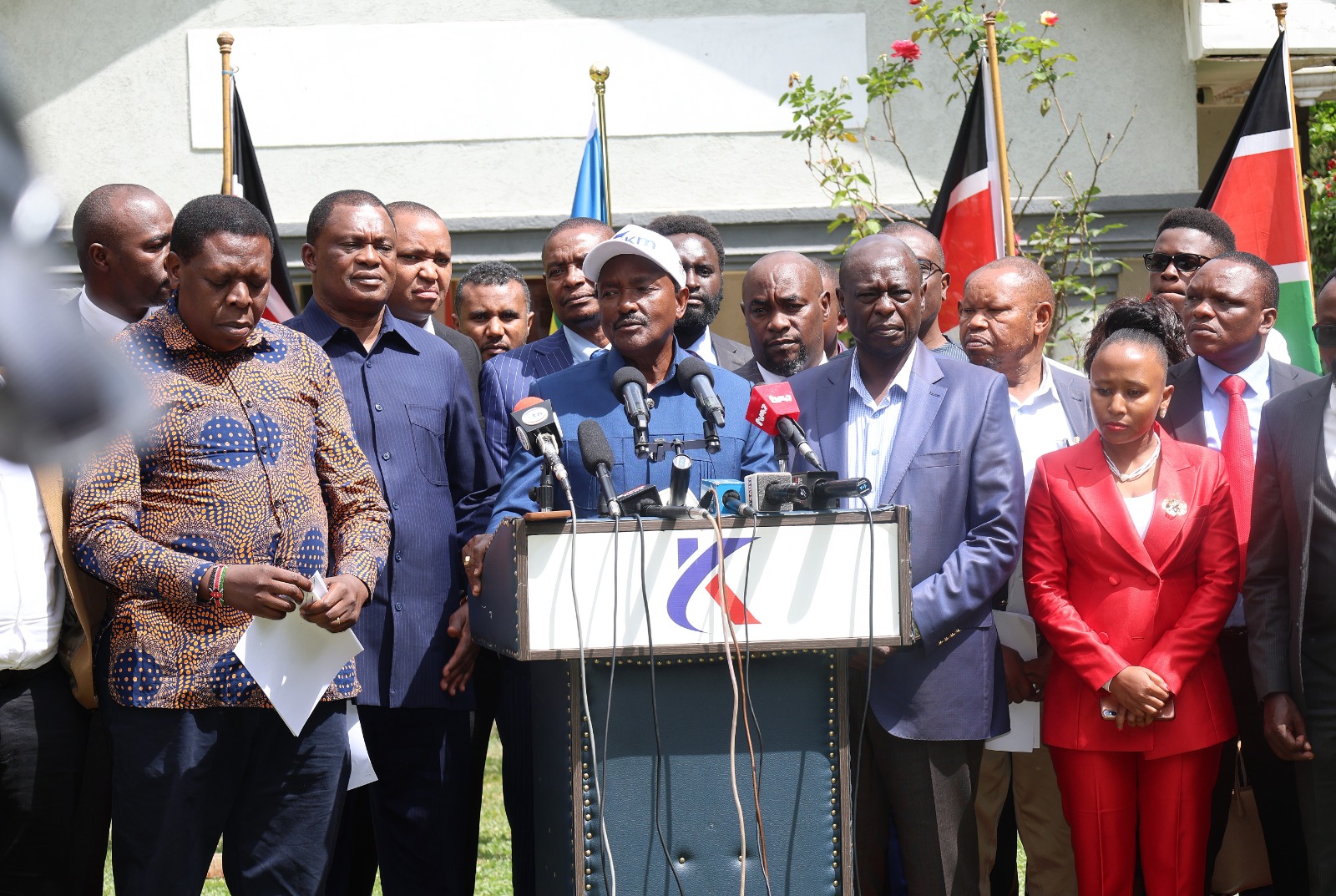
NAIROBI, Kenya, June 11, 2025 — Kenya’s United Opposition has called for a nationwide boycott of Safaricom, the country’s largest telecommunications company, accusing it of aiding the government in the surveillance and abduction of critics, including the late Albert Ojwang, a 31-year-old teacher whose death in police custody has sparked widespread outrage.
The opposition’s allegations, detailed in a joint statement issued today, intensify scrutiny of Safaricom’s alleged role in enabling state repression amid escalating tensions with the Kenya Kwanza administration.
Albert Ojwang, a Kiswahili and Religious Studies teacher from Voi, was arrested on June 6, 2025, in Kakot, Homa Bay, over an alleged social media post deemed offensive by Deputy Inspector General of Police Eliud Lagat.
According to the opposition, Ojwang was apprehended by police officers on motorcycles and transported 400 kilometers to Nairobi’s Central Police Station under unclear circumstances.
Within 32 hours, he was pronounced dead on arrival at Mbagathi Hospital at 1:39 a.m. on June 8, with a post-mortem revealing injuries consistent with violent assault, including head trauma and neck compression.
The opposition’s statement, delivered by senior leaders including former Deputy President Rigathi Gachagua, Kalonzo Musyoka and Former Attorney General Justin Muturi, condemned the Ruto-led government for what they described as a pattern of “illegal surveillance, abductions, and illegitimate detentions.”
They specifically accused Safaricom of sharing Ojwang’s location data with authorities, facilitating his arrest and subsequent death.
“Safaricom is complicit and a facilitator in the tracing and abduction of Kenyans who have either ended up dead or maimed,” the statement read, warning of potential legal action or a consumer boycott if the company does not address these allegations.
Safaricom has faced similar accusations in the past. In 2024, during protests against the controversial Finance Bill, social media users and activists claimed the telecom giant provided user data to police, enabling the abduction of protest organizers.
Safaricom denied these claims, stating it adheres to Kenya’s data protection laws and requires a court order to share customer information.
In a statement issued in October 2024, the company refuted reports of granting authorities “unfettered access” to customer data, emphasizing its commitment to privacy.
The opposition’s demands extend beyond Safaricom. They called for the immediate arrest and prosecution of Deputy Inspector General Eliud Lagat, alleging his involvement in Ojwang’s death, and urged protection for junior officers who may hold critical information.
The coalition also raised questions about the lack of transparency surrounding Ojwang’s arrest, including the absence of a formal complaint, the rationale for transferring him to Nairobi, and the condition of CCTV footage at Central Police Station.
They dismissed the Independent Policing Oversight Authority’s (IPOA) investigation, ordered by the Director of Public Prosecutions on June 10, as a “cover-up” to delay accountability.
Public sentiment, particularly on social media platforms like X, reflects growing distrust of Safaricom.
Posts circulating since October 2024 have accused the company of collaborating with the Directorate of Criminal Investigations (DCI) to track activists using mobile data and GPS locations.
One user claimed, “Safaricom has been helping the government track down Kenyans for a while… That’s how government has been carrying out abductions.”
Another urged Kenyans to switch to alternatives like Starlink, citing safer communication channels.
The Kenya National Commission on Human Rights (KNCHR) reported more than 80 cases of abductions and forced disappearances since the youth-led protests between June and August 2024, further fueling public anger.
Activists like Willie Oeba have called for Safaricom to be held accountable, arguing that its alleged data-sharing practices violate Kenya’s data protection laws.
A boycott, if successful, could significantly impact Safaricom, which processes more than half of Kenya’s GDP through its M-Pesa mobile money service.
In response to the allegations, Safaricom CEO Dr. Peter Ndegwa issued a position statement today, June 11 categorically denying any involvement in Ojwang’s arrest or death.
“At no point was there any contact between Safaricom and any security agency in investigating or arresting the late Albert,” Ndegwa stated, adding that the company only became aware of the arrest through media reports.
The CEO expressed particular concern over remarks by Hon. Justin Muturi linking the company to what he termed “the unfortunate incident.”
Ndegwa called on Kenyans to “ignore any attempts to incite them and remain firm in demanding accountability through transparent investigations,” while also urging leaders to push for a credible investigation that would bring perpetrators to justice.
In his statement, Ndegwa reiterated the company’s commitment to data protection, stating that Safaricom has “always been safe and secure in how we handle their data, and we will continue to do so now and in the future.”
The company, 35% owned by the Kenyan government, has previously attributed service disruptions to technical issues, such as undersea cable outages, rather than deliberate interference.
However, global internet observatory NetBlocks has questioned these explanations, noting that past disruptions coincided suspiciously with protest activities.
The opposition’s call for a boycott echoes previous campaigns against Safaricom.
In 2017 and 2023, opposition leader Raila Odinga targeted the company for alleged complicity in election rigging and government repression, respectively.
While those efforts had limited impact, the current wave of anger, amplified by Ojwang’s death and ongoing abductions, could pose a greater threat to Safaricom’s market dominance, especially with competitors like Airtel Kenya and Starlink gaining traction.
As Kenyans await answers, the opposition has declared June 25 a “People’s Public Holiday” to honor those killed under the current regime.
Vigils outside Vigilance House continue, with protesters demanding justice for Ojwang and others.
The government, meanwhile, denies involvement in abductions, with Majority Leader Kimani Ichung’wah claiming some incidents are staged to incite unrest.
The controversy places Safaricom at a critical juncture, balancing its role as a vital economic player against accusations of enabling human rights violations. As calls for accountability grow louder, the nation watches to see whether the telecom giant can restore public trust or face the consequences of a coordinated boycott.
Kenya Insights allows guest blogging, if you want to be published on Kenya’s most authoritative and accurate blog, have an expose, news TIPS, story angles, human interest stories, drop us an email on [email protected] or via Telegram
-

 Grapevine2 weeks ago
Grapevine2 weeks agoAlleged Male Lover Claims His Life Is in Danger, Leaks Screenshots and Private Videos Linking SportPesa CEO Ronald Karauri
-

 Grapevine1 week ago
Grapevine1 week agoRussian Man’s Secret Sex Recordings Ignite Fury as Questions Mount Over Consent and Easy Pick-Ups in Nairobi
-

 News5 days ago
News5 days agoTHE FIRM IN THE DOCK: How Kaplan and Stratton Became the Most Scrutinised Law Firm in Kenya
-

 Investigations7 days ago
Investigations7 days agoMulti-Million Dollar Fraud: Three Kenyans Face US Extradition in Massive Cybercrime Conspiracy
-

 Economy6 days ago
Economy6 days agoIran Demands Arrest, Prosecution Of Kenya’s Cup of Joe Director Director Over Sh2.6 Billion Tea Fraud
-

 Business6 days ago
Business6 days agoA Farm in Kenya’s Rift Valley Ignites a National Reckoning With Israeli Investment
-

 Africa1 week ago
Africa1 week agoFBI Investigates Congresswoman Ilhan Omar’s Husband’s Sh3.8 Billion Businesses in Kenya, Somalia and Dubai
-

 Business2 weeks ago
Business2 weeks agoM-Gas Pursues Carbon Credit Billions as Koko Networks Wreckage Exposes Market’s Dark Underbelly


